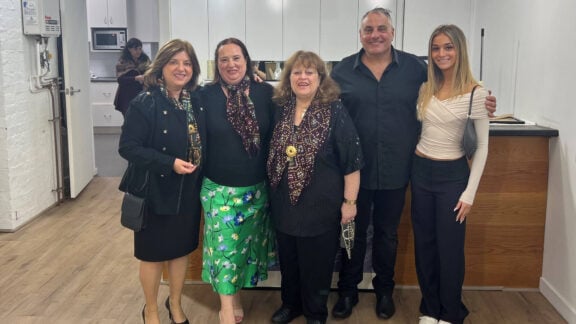Young people are increasingly living with their parents well into their thirties, a recent report found.
The Australian Institute of Family Studies (AIFS), using the Census from 2006, 2011, 2016 and 2021 found that more young people, in their early twenties, were still living at home with parents, a percentage higher than ever before. And this pattern, according to the AIFS, continues until their early thirties.
Men were more likely than women to live with parents at all ages, with 20.5 per cent of men aged 25-29 living with parents and 9.25 per cent of men aged 30-34 still living at home.
For women, 13.25 per cent of 25-29-year-olds were still at home while five per cent of women aged 30-34 lived with parents.
Greeks living with their parents past 25
Among Australian-born young adults, the report found that those with Asian, Middle Eastern, African, or Southern and Eastern European ancestry were the most likely to live with their parents, compared to those with Anglo, North-Western European or New Zealand backgrounds.
In 2021 COVID meant that many moved back home to be with family during lockdowns, regardless of that people live at home into their late 20s and early 30s.
The AIFS study showed that 456,543 people aged between 24-34 were living with parents in 2021, an increase of almost 17 per cent from 2016.
Neos Kosmos spoke to young Greek Australians, aged 26 to 32, about living at home with their parents and some common themes emerged. The key issue was affordability and cost of living.
“The main reason why I am still living with my parents is due to the affordability crisis Melbourne is facing,” said a 32-year-old Greek-Australian man who wished to remain anonymous to Neos Kosmos.
He said that choosing to rent, places individuals at a disadvantage in terms of saving the money to “buy a new house.”
“You’re caught in a dilemma of deciding between renting or putting your money towards potentially purchasing a home.”
As a potential first-time buyer, he said he might not be able to buy a townhouse and considered an apartment as the “more likely” option. In his mind, “rising interest rates” and the associated “increase in payment amounts for home loans,” were serious considerations.
“I’m in the same boat as others my age, we’ve got to start looking further out from the CBD to find a suitable option that can withstand inflation, potential interest rate rises, and the current economic uncertainty in Australia.”
Cultural aspects of living at home with parents
Neos Kosmos asked if Greek Australian cultural traditions played a role for these people staying home. In other words, Greek Australians stay home until they have a partner. He acknowledged that “being Greek” poses challenges to “living with parents,” but said it also provides “a sense of security.”
His parents are “supportive” and comfortable with him living at home, with the view that he is saving money “to eventually move out.”
Catherine, a 27-year-old Greek Australian woman, said that if she was “in a financial position” to buy a property, but her preference is a house due to its “better value for money.” However, if she was to rent, an apartment would be “the better option.”
The socio-cultural aspect of “Greeks living with their parents,” was on her mind and added that there is a “stigma” attached to moving out unless one finds a partner.
She said that this cultural phenomenon which many Southern European and other immigrant communities also deal with, influenced her in the past. However, as she gets older, this influence has diminished.
Being unemployed she acknowledges that there is “more tension in the house” compared to when she was working and part of this tension according to her, is since she now spends “more time at home.”
Even though she said her “mother likes having someone at home,” she felt that her father feels more constrained in his ability to make decisions.
Another 26-year-old Greek Cypriot-Australian woman, who wanted to remain anonymous, told Neos Kosmos that she chooses to continue living with her parents because it offered “comfort and financial stability.”
She said it’s “easy living at home,” as there are “no expenses involved,” something that makes sense given the high cost of living and stressed that there is no urgency to move out.
Nevertheless, she said she is in a relationship and that has shifted her perspective but admits that if she were not in a relationship, she would not consider moving out “anytime soon.”
She believes that her parents would be “fine” with either scenario, given that she has a “well-thought-out plan in place,” and notes that her situation is common, and pointed out that her 30-year-old brother is in a similar situation.
“They want us to save as much as we can, to ensure that we are going to be okay, when we are ready to move out,” she said.
Economic factors at the centre
Billy, a 26-year-old Greek Australian told Neos Kosmos he is still living at home but has thought about leaving home, but it was too “difficult in the current economic climate.”
Billy felt no pressure from his parents to move out, who are happy with him staying.
“My parents do not have any issues with me living at home but are not necessarily opposed to me moving out, it’s something that they know I would like to do in the next year or so.”
“I feel like in this day and age it’s more common for people at my age to move out as opposed to my parents’ generation where you only move out once married.”
When asked if culture and tradition play a part in his current situation he said, “it’s a cultural thing, our parents were brought up in a certain way and in the same way they pass on their learnt experiences to us and teach us our culture and traditions, staying at home is very common throughout our culture.”
With his parents being happy with him at home, or with whatever he decides to do, there is “no tension at home” but naturally as he gets older the more freedom he wants.
“I want the luxury of not having to tell anyone where I am going.”
The AIFS findings resonate with those that Neos Kosmos spoke to – cost of living and unaffordability of housing do play a role. However, the cultural aspect of being Greek Australian also means there is less pressure to leave the comfortable embrace of the parents.








